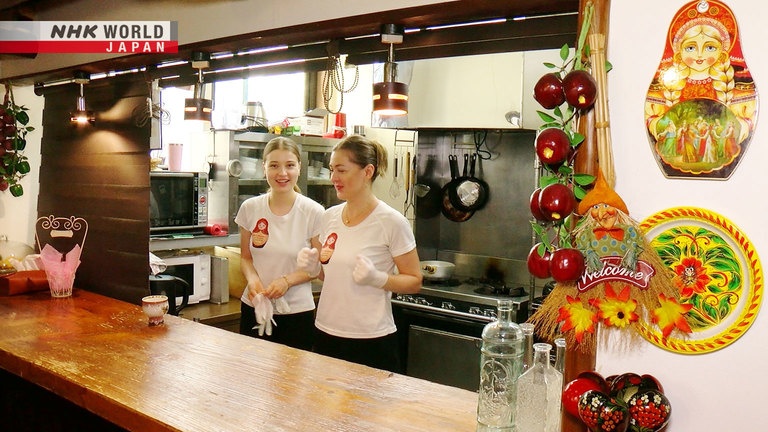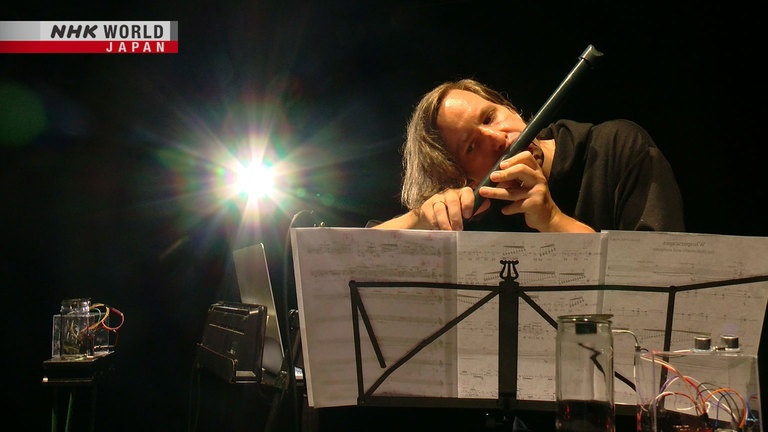Russians in Japan Speak Out
Over one and a half years have passed since Russia invaded Ukraine. Through a monthly radio show NHK WORLD-JAPAN's Russian language broadcasting offers opportunities for Russians in Japan to talk about their thoughts and emotional struggles. We revisit people who appeared on the program – a mother and daughter running a restaurant and a musical composer – to ask about their current situation.



Transcript
NHK WORLD-JAPAN's Russian language service broadcasts daily news and programs on radio
and over the web from Japan to the world.
Since the start of Russia's invasion of Ukraine, one radio program offers opportunities
for Russians in Japan to talk about their thoughts and emotional struggles.
It was such a painful situation.
For days, I couldn't sleep or eat.
I was in a state of shock.
I was panicking.
Why do innocent people have to die?
I want to help somehow,
in any way I can.
In Russia, the public expression of opinions, individual or otherwise, is restricted.
Because of that, the Russians in Japan we interviewed
are determined to share their honest thoughts and feelings with the rest of the world.
This July, we revisited people who had appeared on our Russian language radio program last year.
In Chiba City near Tokyo, this mother and daughter from Russia run a restaurant.
About twenty years ago, Anastasia Stetsyuk moved to Japan for her work.
Her grandfather was from Ukraine.
Her daughter Daiana grew up in Japan from the age of six.
Five years ago, the two opened up this restaurant that serves both Russian and Ukrainian cuisine.
When the invasion began, as Russians, they felt the need to voice their opposition to the war.
They also started support efforts for Ukrainian evacuees in Japan.
From their own experience learning to live here amidst linguistic barriers,
they understood the evacuees' need for help.
Displayed in the restaurant along with the shop's own flag was the Ukrainian flag -
the better to express their wish to support Ukraine.
However, the restaurant became the target of harassing phone calls,
and slander against Russians began to appear on their social media.
Strongly wishing to show some Russians too were against the war,
Anastasia and Daiana accepted many interviews for newspapers and other media.
We're simply doing whatever
we can by ourselves.
We wanted to say we weren't
on either side.
We hope to bring people on
the Russian side who agree with the war...
to change their minds,
even if only a little.
But as the conflict persisted, the situation only got worse.
Realizing that no amount of effort would stop the war, Anastasia began to feel powerless.
Of course, I feel sorry for people there.
But for now, nothing I can do would
influence the political situation.
If I constantly thought about the war,
our lives would just pass by.
So, we must focus
on living in the moment.
After much consideration, the two made the hard decision to take down the flags they'd put up at the entrance.
They'd grown weary of being questioned over whether they were on the Russian or Ukrainian side.
We decided to remove anything
that could offend or irritate people.
Eventually, we also changed our menu.
Anastasia and Daiana now want to make their restaurant
a place to support people in Japan with foreign roots.
They reduced the number of Russian dishes on their menu,
and added original recipes suggested by Daiana.
Namely, they increased their vegan options, hoping to allow anyone to enjoy meals regardless of their religion or beliefs.
We want our restaurant to also be
a place where people can meet.
I feel there's a lot we
can contribute as foreigners...
who've been in Japan a long time,
and as restaurant owners.
We also met an artist in Japan, who, far from his native Russia,
expresses his opposition to the war through music and sound.
Leonid Zvolinsky appeared on our radio program this April.
He used to work as a composer in Moscow.
He and his Japanese wife moved to Japan six years ago.
Now as a graduate student in university in Tokyo,
he researches abstract music and sound art in conjunction with technology.
He explains how the invasion of Ukraine was a major shock to him.
It's inacceptable.
Everything just fell apart.
We couldn't tell what would come next.
From the start of the invasion, Leonid has been strongly opposed to the war.
As an artist, he feels he can't remain silent.
I make 'music about music'
or 'sound about sound.'
But if I keep doing abstract music,
it's just as insignificant as...
posting photos of cats on social media
and pretend I'm not concerned.
It'd be completely wrong, in my opinion.
He openly expressed his opposition to the war on social media,
but it caused some people to cut ties with him due to differing opinions on the conflict.
Even among Russians, they couldn't share their thoughts freely and frankly.
How to express such a situation through music?
In July, Leonid completed a piece titled "Whisperscapes."
He uses the sounds of the traditional Japanese instrument "shakuhachi" to represent whispering voices.
Russians are unable to freely express themselves, and can only whisper
- this is what Leonid imparts to his music to depict this heartbreaking and frustrating situation.
He explains that to continue to create music is his own way of speaking against the war.
We can't turn back time.
It keeps going on.
I must use my time to do what I can,
what I want. It's my own form of protest.
So, I can't let those who started the war
take away my freedom to live my life.
There seems to be no end in sight to the current chaos and uncertainty.
We will continue to relay the voices of those who,
refusing to abandon hope, stand up for a better future.